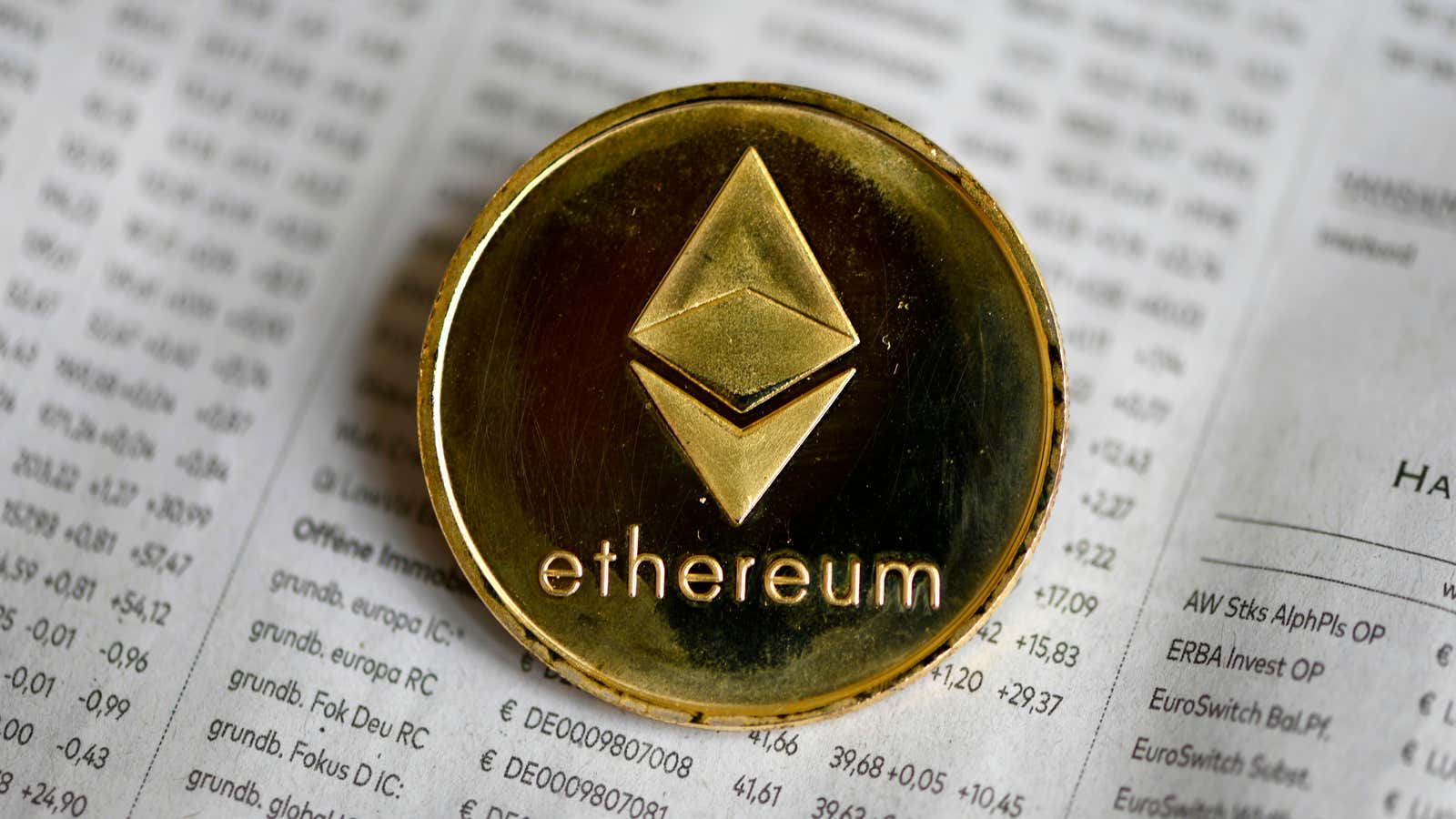There’s a crypto land grab afoot, but this time it doesn’t involve pricy JPEGs of simian lowlifes, shiba inu-themed meme coins, or virtual real estate in the metaverse. This speculative boom is, in a sense, something internet entrepreneurs have been doing for decades: buying up domain names to make a buck. This kind of domain name doesn’t end in .com or .org, but .eth.
Administered by the Ethereum Name Service (ENS), .eth domains serve as a public profile to showcase an individual’s transactions and holdings on the Ethereum blockchain. If you’ve been on Twitter, you’ve probably seen them on crypto-focused users’ profiles.
Typing a .eth domain into your web browser won’t bring up an account, but doing so on the Etherscan database or a third-party website like Blockchair will bring up a user’s assets and transactions, including non-fungible tokens, or NFTs.
Once an ENS domain is registered, it can be sold on the secondary market, for example on OpenSea, because it is, in itself, an NFT.
The price of Ether, the native cryptocurrency of the Ethereum blockchain, is down more than half of its high of about $4,500 in November 2021. So why are ENS sales spiking now?
ENS domain name sales are surging
ENS registrations have been rising since the service began in 2017, but have surged in 2022. In July, the ENS reported record numbers: 378,804 .eth domain names were registered, 25,000 names were renewed, and it made about $3.9 million in net income.
In the last 30 days, ENS was the ninth most popular Ethereum-based NFT collection on OpenSea, the largest peer-to-peer NFT marketplace, having processed about $9.5 million in trading volume during that time. ENS sells individual domains and, as all NFTs creators, receives a cut of secondary sales on platforms like OpenSea.
But ENS is not a supply-limited NFT collection like CryptoPunks or Bored Ape Yacht Club, which have floor prices equivalent to hundreds of thousands of US dollars. With ENS, there are unlimited .eth domain names, but only some are extremely valuable.
Personal websites for web3
For many people interested in crypto, buying an ENS domain is like buying a personal website. If I own scottnover.com to represent myself in web2, why not also buy scottnover.eth for crypto-focused web3? (I still haven’t done it.)
At the company Rally, an online auction house for buying and selling fractional shares in collectibles such as baseball cards and NFTs, co-founder Rob Petrozzo noticed many of his colleagues changing their handles in the company Slack workspace to their personal ENS domains.
Then large brands started registering or buying their ENS domains on the secondary market, he said. “In the last 24 hours, nike.eth just sold for $60,000,” he said when we spoke in July. “Chanel.eth and hermes.eth, which are owned by private buyers, both got bids in the last 24 hours of, I think, $50,000 to $60,000.”
But some of the highest-value ENS domains have been those with three digits, such as 123.eth or 456.eth. The cheapest three-digit ENS domain listed on OpenSea is currently selling for about $38,000. Nick Johnson, founder and lead developer of ENS, told Quartz that a lot of the new registrations and secondary ENS sales have been driven by interest in the 999 Club or the 10k Club, online social clubs for the owners of three or four-digit ENS domains.
Rally got in on the action too, recently, listing 105.eth on its platform. The offering, which is split up into equity shares, sold out in 10 minutes, Petrozzo said.
What’s the point of an ENS domain?
ENS domains are at once very private and very public. They can be pseudonyms—a way to identify oneself in crypto transactions—or one’s real name.
They also display a ledger of that person’s assets and transactions, which would be a head-scratching concept in traditional banking or finance. But ultimately they show that, despite the rising speculation, there is functionality in ENS domains that gets to the core of how people represent themselves in so-called web3.
“What’s interesting is that the person behind this domain name might actually use other domain names when interacting in other settings,” said Al Morris, founder of the decentralized publishing protocol Koii Network. “So he could be using one for, perhaps, a consulting practice or for another business, and so you could see how someone might actually want to use ten of these domains and have each of them designed to preserve his or her underlying identity.”
